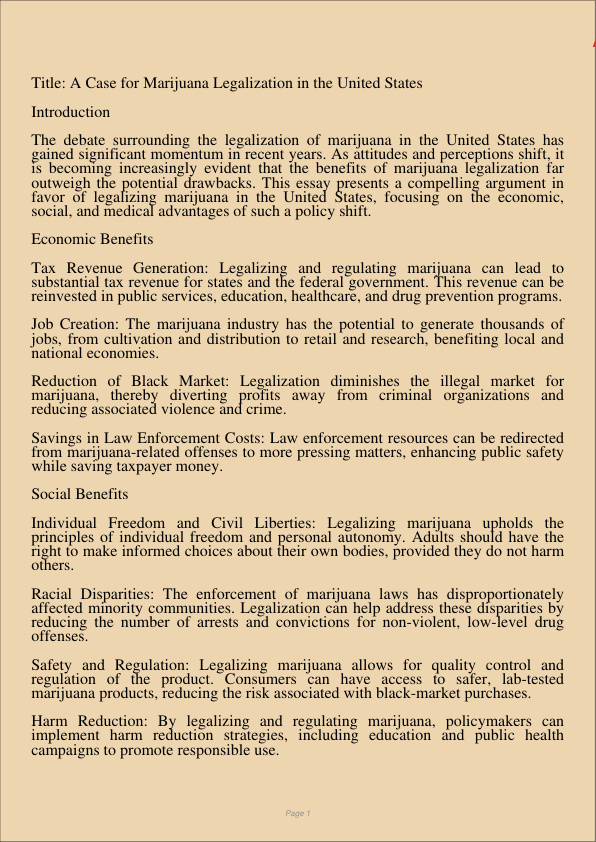Title: A Case for Marijuana Legalization in the United States
Introduction
The debate surrounding the legalization of marijuana in the United States has gained significant momentum in recent years. As attitudes and perceptions shift, it is becoming increasingly evident that the benefits of marijuana legalization far outweigh the potential drawbacks. This essay presents a compelling argument in favor of legalizing marijuana in the United States, focusing on the economic, social, and medical advantages of such a policy shift.
Economic Benefits
Tax Revenue Generation: Legalizing and regulating marijuana can lead to substantial tax revenue for states and the federal government. This revenue can be reinvested in public services, education, healthcare, and drug prevention programs.
Job Creation: The marijuana industry has the potential to generate thousands of jobs, from cultivation and distribution to retail and research, benefiting local and national economies.
Reduction of Black Market: Legalization diminishes the illegal market for marijuana, thereby diverting profits away from criminal organizations and reducing associated violence and crime.
Savings in Law Enforcement Costs: Law enforcement resources can be redirected from marijuana-related offenses to more pressing matters, enhancing public safety while saving taxpayer money.
Social Benefits
Individual Freedom and Civil Liberties: Legalizing marijuana upholds the principles of individual freedom and personal autonomy. Adults should have the right to make informed choices about their own bodies, provided they do not harm others.
Racial Disparities: The enforcement of marijuana laws has disproportionately affected minority communities. Legalization can help address these disparities by reducing the number of arrests and convictions for non-violent, low-level drug offenses.
Safety and Regulation: Legalizing marijuana allows for quality control and regulation of the product. Consumers can have access to safer, lab-tested marijuana products, reducing the risk associated with black-market purchases.
Harm Reduction: By legalizing and regulating marijuana, policymakers can implement harm reduction strategies, including education and public health campaigns to promote responsible use.
Medical Benefits
Medicinal Value: Marijuana has well-documented medicinal properties. Legalization allows patients to access it for the treatment of various medical conditions, including chronic pain, epilepsy, nausea, and symptoms associated with cancer and HIV/AIDS.
Research Opportunities: Legalization promotes scientific research into the medical potential of marijuana and its various compounds, potentially leading to the development of new treatments and therapies.
Opioid Crisis Mitigation: Studies suggest that legal access to marijuana can reduce opioid use and addiction. This can play a vital role in combating the opioid epidemic currently plaguing the United States.
Improved Quality and Safety: Legalization ensures that medical marijuana is produced and distributed under regulated conditions, guaranteeing its quality and safety for patients.
Counterarguments
Potential for Increased Use: Critics argue that legalization may lead to increased marijuana use, especially among young people. However, evidence from states that have already legalized marijuana does not support this claim.
Impaired Driving: Concerns exist about the impact of marijuana on road safety. Legalization can be paired with robust regulations and education to mitigate this risk.
Conclusion
The benefits of legalizing marijuana in the United States are numerous and compelling. From generating tax revenue and job opportunities to reducing the burden on the criminal justice system, marijuana legalization offers significant economic and social advantages. Additionally, access to medical marijuana can provide relief to patients suffering from various medical conditions. While concerns remain, responsible regulation, education, and harm reduction strategies can address these issues. The time has come for a rational, evidence-based approach to marijuana policy that prioritizes individual liberty, public health, and economic well-being. Legalization is a viable and beneficial path forward for the United States.

「真诚赞赏,手留余香」
真诚赞赏,手留余香
使用微信扫描二维码完成支付
